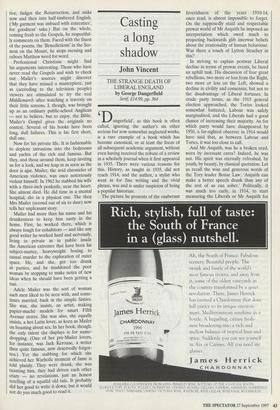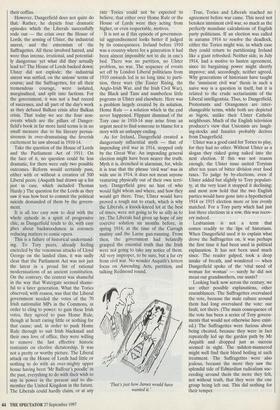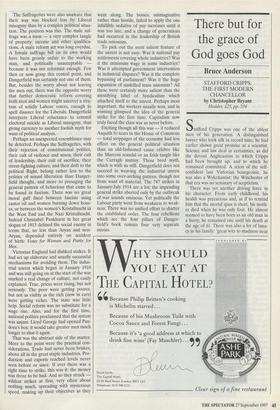Casting a long shadow
John Vincent
THE STRANGE DEATH OF LIBERAL ENGLAND by George Dangerfield Serif, £14.99, pp. 364 Dangerfield', as this book is often called, ignoring the author's six other serious but now somewhat neglected works, is a rare example of a book which has become canonical, or at least the focus of all subsequent academic argument, without even having received the tribute of a review in a scholarly journal when it first appeared in 1935. There were various reasons for this. History, as taught in 1935, did not reach 1914; and the author, a stylist who went in for fine writing and the vivid phrase, was and is under suspicion of being a popular historian.
The picture he presents of the exuberant feverishness of the years 1910-14, once read, is almost impossible to forget. On the supposedly staid and respectable prewar world of Mr Asquith he imposed an interpretation which owed much to projecting backwards glib interwar beliefs about the irrationality of human behaviour. Was there a touch of Lytton Strachey in this?
In striving to explain postwar Liberal decline in terms of prewar events, he faced an uphill task. His discussion of four great rebellions, two more or less from the Right, two more or less on the Left, showed a decline in civility and consensus, but not to the disadvantage of Liberal fortunes. In crude party terms, as the 1915 general election approached, the Tories looked somewhat battered, Labour was safely marginalised, and the Liberals had a good chance of increasing their majority. As for which party would have disappeared by 1950, a far-sighted observer in 1914 would have said that, as between Labour and Tories, it was too close to call.
And Mr Asquith, was he a broken reed, worn by incessant cares? Indeed, he was not. His spirit was eternally refreshed, by youth, by beauty, by classical quotation. Let us recall the wise and generous words of the Tory leader Bonar Law: 'Asquith can make a better speech drunk than any of the rest of us can sober.' Politically, it was much too early, in 1914, to start measuring the Liberals or Mr Asquith for their coffins.
However, Dangerfield does not quite do that. Rather, he depicts four dramatic episodes which the Liberals successfully rode out — the crisis over the House of Lords, the arming of Ulster, the industrial unrest, and the extremism of the Suffragettes. All these involved hatred, and were thus intense, irrational, and potential- ly dangerous: yet what did they actually lead to? The House of Lords backed down; Ulster did not explode; the industrial unrest was settled, on the unions' terms of course; and the Suffragettes, for all their tremendous courage, were isolated, marginalised, and split into factions. For the government, it was not a bad record of successes, and all part of the day's work as they defused Balkan crisis after Balkan crisis. That today we see the four non- events which are the pillars of Danger- field's book in far more lurid terms is in no small measure due to his literary persua- siveness in over-dramatising the feverish excitement he saw abroad in 1910-14.
Take the question of the House of Lords and the Parliament Act of 1911. On the face of it, no question could be less dramatic, for there were only two possible outcomes. Reform would certainly pass, either with or without a creation of 500 Liberal peers. (Asquith had drawn up a list just in case, which included Thomas Hardy.) The question for the Lords as they saw it was how best to commit the political suicide demanded of them by the govern- ment.
It is all too easy now to deal with the whole episode in a spirit of progressive chic, as Dangerfield tends to do, with easy jibes about backwoodsmen in coronets reducing matters to comic opera.
This is a failure of historical understand- ing. To Tory peers, already feeling encircled by the venomous attacks of Lloyd George on the landed class, it was sadly clear that the Parliament Act was not just the latest in a proud list of rational modernisations of an ancient constitution. On the contrary, the context was shameful in the way that Watergate seemed shame- ful to a later generation. What the Tories observed, with reason, was that the Liberal government needed the votes of the 70 Irish nationalist MPs in the Commons, in order to cling to power: to gain these Irish votes, they agreed to pass Home Rule, though at heart caring little or nothing for that cause; and, in order to push Home Rule through to suit Irish blackmail and their own love of office, they were willing to remove the last effective historic restraints on elective dictatorship. It was not a pretty or worthy picture. The Liberal attack on the House of Lords had little or nothing to do with an over-mighty upper house having been 'Mr Balfour's poodle' in the past, everything to do with their wish to stay in power in the present and to dis- member the United Kingdom in the future. The Liberals could hardly claim, or at any rate Tories could not be expected to believe, that either over Home Rule or the House of Lords were they acting from higher, or even respectable, motives.
It is not as if this episode of governmen- tal aggrandisement looks better if judged by its consequences. Ireland before 1910 was a country where for a generation it had been almost impossible not to die in one's bed. There was no partition, no Ulster problem, no war. The sequence of events set off by London Liberal politicians from 1910 onwards led in no long time to parti- tion, three wars (the Easter Rising, the Anglo-Irish War, and the Irish Civil War), the Black and Tans and numberless little pogroms in Ulster and elsewhere. Here was a problem largely created by its solution, Home Rule — a solution which in the end never happened. Flippant dismissal of the Tory case in 1910-14 may arise from an urgent need to find someone to blame for a story with an unhappy ending.
As for Ireland, Dangerfield created a dangerously influential myth — that of impending civil war in 1914, stopped only by the Great War. An impending general election might have been nearer the truth. Myth it is, drenched in alarmism, for, while it is true that the phrase 'civil war' was in wide use in 1914, it does not mean anyone venturing physically out of their own terri- tory. Dangerfield gave no hint of who would fight whom and where, and how they would get there. True, Ulster would have proved a tough nut to crack, which is why the Liberals, a knock-kneed lot at the best of times, were not going to be so silly as to try. The Liberals had given up hope of any coercive solution six months before, in spring 1914, at the time of the Curragh mutiny and the Larne gun-running. From then, the government had belatedly grasped the essential truth that the Irish were not going to take any notice of them. All very improper, to be sure, but a far cry from civil war. No wonder Asquith's letters focus on Amending Acts, partition, and talking Redmond round.
That's just how James would have wanted it.' True, Tories and Liberals reached no agreement before war came. This need not betoken imminent civil war, so much as the perfectly mundane calculations of English party politicians. If an election was called in autumn 1914 to resolve the deadlock, either the Tories might win, in which case they could return to partitioning Ireland like a giant refreshed. Neither side, in July 1914, had a motive to hasten agreement, since its bargaining power might shortly improve; and, accordingly, neither agreed. Why generations of historians have taught the 'imminent civil war' thesis in such a naive way is a question in itself, but it is related to the crude sectarianism of the Liberal intelligentsia. Thus, to Dangerfield, Protestants and Orangemen are inter- changeable terms, while both are depicted as bigots, unlike their Ulster Catholic neighbours. Much of the English television producer's view that Unionists are laugh- ing-stocks and fanatics probably derives from Dangerfield.
Ulster was a good card for Tories to play, for they had no other. Without Ulster as a slogan they risked going naked into the next election. If this was not reason enough, the Ulster issue united Toryism after ten years of bitter division over food taxes. To judge by by-elections, even if Ulster added but slightly to Tory populari- ty, at the very least it stopped it declining; and most now hold that the two English parties would have gone into a hypothetical 1914 or 1915 election more or less evenly matched. For a Tory party which had just lost three elections in a row, this was recov- ery indeed.
Lesbianism is not a term that comes readily to the lips of historians. When Dangerfield used it to explain what drove the Suffragettes on, it was perhaps the first time it had been used in political explanation. It has not been used much since. The reader gulped, took a deep intake of breath, and wondered — when Dangerfield spoke of the 'vital need of woman for woman' — surely he did not mean our grandmothers, our aunts?
Looking back now across the century, we see other possible explanations, other resemblances. The Suffragettes overvalued the vote, because the male culture around them had long overvalued the vote: our fault, not theirs. (The main consequence of the vote has been a series of Tory govern- ments that would not otherwise have exist- ed.) The Suffragettes were furious about being cheated, because they were in fact repeatedly led up the garden path by Mr Asquith and dropped just as success seemed in sight. The mildest-mannered might well find their blood boiling at such treatment. The Suffragettes were also jealous, because the more they saw the splendid tide of Edwardian radicalism suc- ceeding around them the more they felt, not without truth, that they were the one group being left out. This did nothing for their temper. The Suffragettes were also unaware that their way was blocked less by Liberal misogyny than by a complex political situa- tion. The position was this. The male suf- frage was a mess — a very complex tangle of property, income and other qualifica- tions. A male reform act was long overdue. A female suffrage bill on its own would have been grossly unfair to the working man, and politically unacceptable because it was not reformist enough. Few then or now grasp this central point, and Dangerfield was certainly not one of them. But, besides the worry about not leaving the men out, there was the opposite worry that further democratic reform covering both men and women might uncover a stra- tum of solidly Labour voters, enough to spell disaster for the Liberals. Dangerfield interprets Liberal reluctance to commit electoral suicide as Liberal misogyny, thus giving currency to another foolish myth for want of political analysis.
Perhaps an unexpected resemblance may be detected. Perhaps the Suffragettes, with their rejection of constitutional politics, their cult of violence and arson, their cult of leadership, their cult of sacrifice, their street-fighting culture, and their drift to the political Right, belong rather less to the politics of sexual liberation than Danger- field thought, and more to presaging the general pattern of behaviour that came to be found in fascism. There was no great moral gulf fixed between fascists using castor oil and women burning down hous- es, or between the women's Kristallnacht in the West End and the Nazi Kristallnacht. Indeed Christabel Pankhurst in her great slogan of 1913 defined the social enemy in terms that, no less than Aryan and non- Aryan, depended entirely on accident of birth: Votes for Women and Purity for Men.
Victorian England had disliked strikes. It had set up elaborate and usually successful mechanisms for avoiding them. The indus- trial unrest which began in January 1910 and was still going on at the start of the war marked a real change of culture, not easily explained. True, prices were rising, but not seriously. The poor were getting poorer, but not as visibly as the rich (now in cars) were getting richer. The state was little help. Social reform was no substitute for a wage rise. Also, and for the first time, national politics proclaimed that the system was unjust. Lloyd George had opened Pan- dora's box: it would take greater men much longer to shut it again.
That was the abstract side of the matter. More to the point were the practical con- siderations. Trade had never been brisker, above all in the great staple industries. Pro- duction and exports reached levels never seen before or since. If ever there was a right time to .strike, this was it: the money was there to be had. And so they struck wildcat strikes at first, very often about nothing much, spreading with mysterious speed, making up their objectives as they went along. The bosses, unimaginative rather than hostile, failed to apply the one infallible sedative of pay increases until it was too late, and a change of generations had occurred in the leadership of British trade unionism.
To pick out the most salient feature of the unrest is not easy. Was it national pay settlements covering whole industries? Was it the minimum wage in some industries? Was it attempted government intervention in industrial disputes? Was it the complete bypassing of parliament? Was it the huge expansion of unskilled mass unionism? All these were certainly more salient than the mystifying label of Syndicalism which attached itself to the unrest. Perhaps most important, the workers usually won, and in winning glimpsed the idea of the general strike for the first time. Capitalism now truly faced the class war as never before.
Exciting though all this was — it reduced Asquith to tears in the House of Commons — total stoppages of the economy had less effect on the general political situation than an old-fashioned cause celebre like the Marconi scandal or an Irish tangle like the Curragh mutiny. Those bred myth, which is with us still. Dangerfield does not succeed in weaving the industrial unrest into some over-arching pattern, though not from want of material. The 747 strikes in January-July 1914 are a lot; the impending general strike aborted only by the outbreak of war sounds ominous. Yet politically the Labour party went from weakness to weak- ness. There was no unified effort to shatter the established order. The four rebellions which are the four pillars of Danger- field's book remain four very separate stories.












































































 Previous page
Previous page